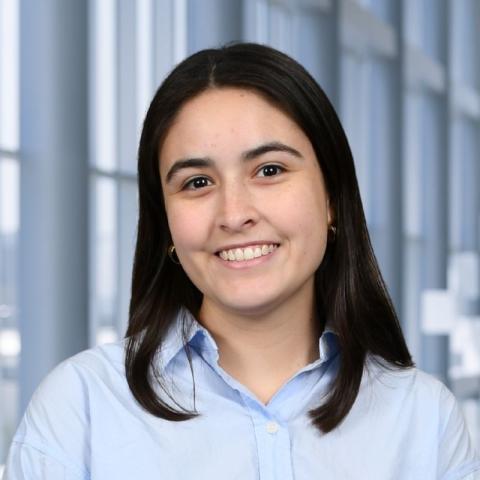
Sharmistha ‘Sharmi’ Mitra, Ph.D.
Principal Investigator
Dr. Mitra was born and raised in Kolkata, India, and came to the United States at the age of 22. She was awarded a scholarship from the U.S. Department of State’s Bureau of Educational and Cultural Affairs to complete her last two years of undergraduate study from the University of New Hampshire (UNH) and obtain a dual Bachelor of Science degree from the United States and India (University of Calcutta, India). After completing her Bachelor of Science in molecular, cellular, and developmental biology from UNH, Dr. Mitra moved to Virginia and completed her graduate studies to receive a doctorate in biological sciences with a focus on the role of ubiquitin-binding proteins in immune signaling pathways from Virginia Tech. Continuing her work in the field of ubiquitin biology, she completed her postdoctoral work with Berge Minassian, M.D., at UT Southwestern, where she worked on identifying the role of malin E3 ligase in Lafora disease pathogenesis. To this end, Dr. Mitra has characterized multiple glycogen metabolism-related E3 ubiquitin ligases using novel mouse models and identified key mechanisms for their glycogen association. She has published these completed projects in peer-reviewed journals such as Acta Neuropathologica, Brain, Neurotherapeutics, and Disease Models and Mechanisms and has written multiple reviews. Additionally, due to her research accomplishments in the field, Dr. Mitra has also obtained multiple internal (within UT Southwestern) and extramural funding, including an R01 from the National Institute of Neurological Disorders and Stroke, to continue to work in the field of E3-ubiquitin ligases and their interaction with brain-glycogen. Overall, with her newly established lab at UT Southwestern, Dr. Mitra sees herself as a unique investigator in the field intersecting E3 ubiquitin ligase and glycogen-biology who is combining a multipronged interdisciplinary approach, including in vitro purified protein biochemistry and in vivo mouse model-based research, to decipher the role of E3 ubiquitin ligases and their interacting proteins in glycogen solubility and associated fatal neurological and neuromuscular disorders.
Apart from science, she loves spending time with her family and close friends, be it indoors or outdoors. On the weekend (or holidays), Dr. Mitra always tries to spend some time doing long-lost hobbies, which include painting, singing, and occasionally cooking.

Surbhi Gahlot, Ph.D.
Research Scientist
Dr. Gahlot is a Research Scientist in the Department of Pediatrics, Division of Child Neurology, at UT Southwestern Medical Center. She obtained her doctorate in neurobiology at the University of Delhi, India, and completed her postdoctoral research programs in the Department of Molecular and Integrative Physiology at the University of Michigan and the Department of Neuroscience at The Ohio State University. Dr. Gahlot joined the faculty at UT Southwestern in July 2022, focusing her research on how the central nervous system regulates energy balance and glucose homeostasis. Her current research interests include understanding the protein-protein interactions in glycogen metabolism and neuromuscular diseases. Dr. Gahlot’s investigations have resulted in numerous publications in peer-reviewed journals, and she has won several awards, including a Pilot and Feasibility Program grant from the Nutrition and Obesity Research Center. Outside of research, she loves hanging out with her family, going outdoors, and trying delicious food.

Rohit Sai Reddy Konada, Ph.D.
Research Scientist
Dr. Rohit Sai Reddy Konada is a Research Scientist in the Department of Pediatrics at UT Southwestern Medical Center (UTSW), currently working in the Mitra Lab. He earned his Ph.D. in Biochemistry from the University of Hyderabad in 2020, where he conducted research on the sorting of lysosomal enzymes and their interactions with mannose-6-phosphate receptors (MPRs) in invertebrates. Dr. Konada joined Dr. Kohler’s group at UTSW in 2020 and specialized in advanced glycan engineering, with particular expertize in the synthesis and application of photocrosslinking sugars, such as CMP-SiaDAz (a diazirine-modified sialic acid), to map complex protein-glycan interactions. His diverse research portfolio includes investigating the role of host fucosylated glycans in Cholera and Pertussis toxin binding, as well as developing environmental biotechnology solutions using Moringa oleifera proteins for heavy metal remediation. His professional trajectory is marked by international experience as an AS-UoH joint Ph.D. fellow at Academia Sinica, Taiwan, and five years of research excellence as a postdoctoral fellow in the Department of Biochemistry at UTSW within the Kohler Lab. In the Mitra lab, he is currently investigating the crosstalk between ubiquitination and glycosylation—two major post-translational modifications—within the context of glycogen metabolism.

James Osborn
Research Assistant II
Mr. Osborn began his career in research while working as a research assistant during his undergraduate years at Kansas State University, working on projects with in vitro research of prostate cancer while completing his degree in food science. After graduating, he continued his research at Texas Tech University, receiving his Master of Science in environmental toxicology with a thesis involving spheroid and organoid culture of prostate cells. In the Mitra lab, Mr. Osborn is involved in projects studying the role of E3 ligases in the pathogenesis of certain glycogen metabolism-related neurological conditions. He uses techniques such as RNA-seq, cell culture, mouse tissue protein analysis, and gene therapy to answer the questions related to his project. In his free time, Mr. Osborn enjoys playing guitar and Brazilian jiu-jitsu.

Silvia Vargas
Research Technician II
Ms. Vargas holds a bachelor’s degree in nanotechnology engineering from Tecnológico de Monterrey in Mexico. During her undergraduate years, she completed an internship at the Institute for Obesity Research at Tecnológico de Monterrey, where she worked with cardiac hypertrophy models for the development of new therapies for reducing cardiovascular diseases. She completed a second internship at Harvard University, where she worked on the fabrication of biomaterials for increasing drug delivery efficiency in autoimmune diseases. Currently, Ms. Vargas works as a technician in the Mitra lab, taking care of the mouse colonies as well as contributing to multiple scientific projects. In her free time, she enjoys reading and doing indoor cycling.